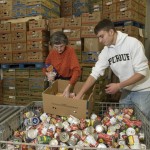 Of course if we got rid of capitalism over night there would be no food poverty, but since this isn’t likely to happen we need to address what we can of the situation from the ground upwards. In the UK at the moment we have a number of things happening with food in terms of people being able to access what they need to live on a day to day basis. Capitalism is the biggest contributing factor to food poverty in the UK, food prices are constantly rising, whilst the money that people earn for their work is falling, stock Market traders gamble on food staples, this pushes the price of food up, supermarkets push the price of food up to generate profits for shareholders, directors and CEO’s. Climate change has also had an effect on our food supply, in recent years we have seen big crop failures both here and in the US, and worryingly these crop failures have been staples such as wheat, corn and potatoes.
Of course if we got rid of capitalism over night there would be no food poverty, but since this isn’t likely to happen we need to address what we can of the situation from the ground upwards. In the UK at the moment we have a number of things happening with food in terms of people being able to access what they need to live on a day to day basis. Capitalism is the biggest contributing factor to food poverty in the UK, food prices are constantly rising, whilst the money that people earn for their work is falling, stock Market traders gamble on food staples, this pushes the price of food up, supermarkets push the price of food up to generate profits for shareholders, directors and CEO’s. Climate change has also had an effect on our food supply, in recent years we have seen big crop failures both here and in the US, and worryingly these crop failures have been staples such as wheat, corn and potatoes.
Even in a conservative Newspaper like the Telegraph, their estimates for people suffering food poverty is estimated as being 18% of the overall UK population that cannot afford to feed themselves, and this was published in June of 2013 and no doubt the figure is now much higher and still rising due to the business as usual approach from the markets and big business.
What is being done on the ground?
The Coalition Government have done absolutely nothing to deal with this ever increasing problem, indeed they are in complete denial that there is a problem and they have had the pompous audacity to claim that it is peoples budgeting skills that are leaving them without food, they also claim that their massive cuts to social provision and welfare have had no impact on peoples ability to buy food. So with a government that caused the problem in the first place not willing to anything to alleviate peoples suffering, the voluntary sector have stepped in to offer what assistance they have been able to, usually in the form of food parcels, and more recently food banks. Food banks have been opening up all over the UK, at food banks people who cannot afford to buy their staples are provided with a mixed of food that has been donated by charitable organizations, individuals and lately, supermarkets. According to the Trussell Trust there has been a 170% rise in people using food banks, there are now 350,000 people accessing food from food banks, and for those people who cannot face the social stigma associated with food banks, many are going out and shoplifting food. There has been a marked increase in the number of people apprehended in shops and supermarkets for taking meat, cheese and other foods because they are unable to buy them due to the imposed austerity measures and the dire economic situation.
Community solutions
 I mentioned briefly at the top of the post, getting rid of capitalism and its associated greed is unlikely to happen in the near future, and without infrastructure being put in place for a more people centred form of economics, taking control of our food now is a tantamount task that needs our utmost attention, luckily there is already something of a food growing revolution occurring in the UK so we can link up these food groups and community initiatives, and get them onto Council estates and social housing where they are needed. There are some hurdles to cross and commitments to make, but things like incredible edible projects need to flourish in urban areas, so to does permaculture. The task ahead is for these projects to link in with local community members who are struggling to get by, so that they themselves can then begin to grow some of their own food in the yards and gardens, or share growing spaces at the many community food growing projects that are popping up, up and down the country. It might sound harsh, but I believe as a food grower and permaculture practitioner, that unless we make elevating food poverty one of our main priorities then we are not engaging in a real feed growing revolution at all.
I mentioned briefly at the top of the post, getting rid of capitalism and its associated greed is unlikely to happen in the near future, and without infrastructure being put in place for a more people centred form of economics, taking control of our food now is a tantamount task that needs our utmost attention, luckily there is already something of a food growing revolution occurring in the UK so we can link up these food groups and community initiatives, and get them onto Council estates and social housing where they are needed. There are some hurdles to cross and commitments to make, but things like incredible edible projects need to flourish in urban areas, so to does permaculture. The task ahead is for these projects to link in with local community members who are struggling to get by, so that they themselves can then begin to grow some of their own food in the yards and gardens, or share growing spaces at the many community food growing projects that are popping up, up and down the country. It might sound harsh, but I believe as a food grower and permaculture practitioner, that unless we make elevating food poverty one of our main priorities then we are not engaging in a real feed growing revolution at all.
